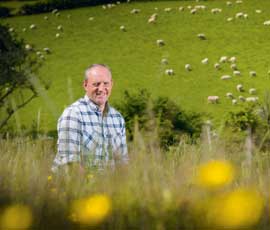Farmers Weekly Sheep Farmer of the Year 2013: Keith Williams

Keith Williams
Hendy, Llandrindod Wells, Powys
By having the vision to think on a global scale, Keith Williams is ensuring a profitable future for both himself and the UK sheep industry as a whole.
Every step of the way, Keith has taken advantage of all the opportunities available to him and, importantly, ensured he used every experience to better his business.
| Farm facts |
|---|
|
| Winning ways |
|
With a view to a changing future without subsidies, he has strived to learn from other countries that are farming without support. This, coupled with his experience of running a HCC demonstration farm, has equipped him with the knowledge to improve his system through better grassland management and genetic selection.
Sheep are now grazed on rotation and generally receive about 1.6ha a day, with an average rotation length of 15 days. Keith believes grass quality has subsequently improved, allowing him to generally finish off grass and avoid supplementing ewes. Cost of production sits at 117p/kg, with a profit of £1.92/kg across beef and sheep.
By running a low-cost system while making the most of animal and plant genetics, and selling into a premium market, he is ensuring his business is safeguarded against future challenges.
Perhaps one of the most notable changes implemented after his time in New Zealand was the introduction of a strict culling policy to breed a flock of easy-care ewes.
“In the past I only used to cull when stock got too old. Now I identify any problem ewes and female offspring will also be culled – no second chances,” he explains. “I believe there’s as much room for improvement by taking the bottom end out as there is from extending the front through genetics,” he says.
“Keith has a keen eye on what’s going on outside his farm and is constantly trying to challenge the way he manages his flock – something all sheep producers should be doing.”
Liz Genever
Senior beef and sheep scientist, EBLEX
Ease of management has been a massive influence on a change in breeding policy that will see the flock of traditionally Welsh, Welsh Mules and Texel crosses change to a flock of Lleyns that will eventually lamb outside.
“We want to move away from the Texel cross ewe to the Lleyns to increase lambing percentage, but still produce a R3L carcass to fit the Waitrose Welsh lamb scheme we sell into,” he says.
Keith also runs a small flock of 60 performance-recorded Texels that are run commercially.
Since 2010 the focus has been on improving muscle depth and his Texel flock is now in the top 5% for the breed. However, he believes he is not getting the market returns for selecting for this trait and consequently is undertaking a Nuffield Scholarship to look at grading. To help his business, along with other producers in the area, he is also working to set up a beef and sheep farmer benchmarking group and is actively involved in a local farmer training group. And at the same time he has a firm eye on preserving the environment, with 25% of ground in environmental schemes and the farm’s carbon footprint and CO2/kg of meat 80% of the average.
Sponsor’s message
 “This year’s Sheep Farmer of the Year winner exemplifies a forward-thinking producer who is striving for the highest level of animal health and performance and constantly looking at ways to improve.”
“This year’s Sheep Farmer of the Year winner exemplifies a forward-thinking producer who is striving for the highest level of animal health and performance and constantly looking at ways to improve.”
Joanne Worthington
MSD Animal Health
Nominate someone else or enter yourself for the 2014 Farmers Weekly Awards.
